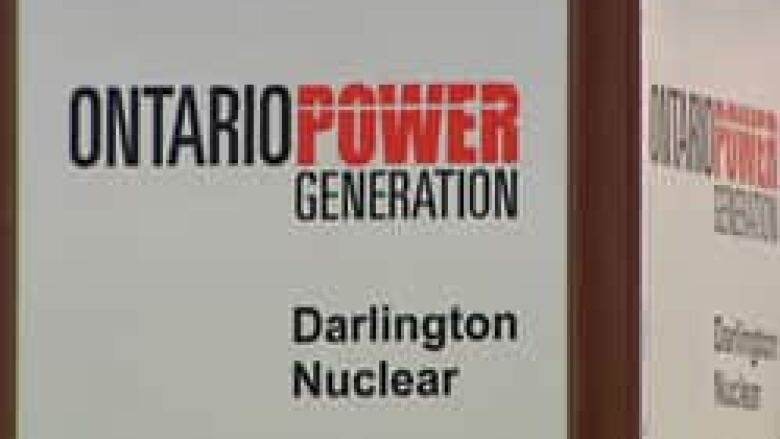Darlington nuclear hearing protesters arrested
Environmentalists had chained themselves inside meeting room
Four protesters who attempted to disrupt hearings Tuesday into the expansion of the Darlington nuclear plant in Ontario have been arrested.
The disturbance began just after 9 a.m. ET when the protesters chained themselves together at the front of the meeting hall, then attached themselves to a nearby table with a second chain. Others held banners reading, "No nukes are safe. Stop Darlington."
"If you're not prepared to move we'll adjourn the hearings until such time as we can proceed in an orderly manner and a fair manner," panel chairman Alan Graham told the group before the panel left the stage.
At 2 p.m. ET Durham Regional Police moved in to arrest the protesters. Five other activists left after a few hours following a discussion with police. Officers had been talking about cutting or sawing the chains, but instead removed the legs of the cafeteria-style table and marched the four off still chained together.
Greenpeace spokesman Shawn Patrick Stensil said there was nothing stopping the panel from proceeding with the activists silently standing in front of them.
"They're just bearing witness to the fact that these hearings are moving forward while ignoring one of the greatest threats to future generations of Ontarians that is a Fukushima-scale [disaster]," Stensil said.
Police told CBC News the protesters had been charged with mischief.
Ontario Power Generation, the government-owned utility that supplies about 70 per cent of the province's electricity, wants to build up to four new reactors to produce about 4,800 megawatts of power.
Tuesday marked the second day of three weeks of hearings to gather public opinion on the project. The current nuclear crisis in Japan has heightened concerns about the Darlington expansion.
'Lessons learned'
The situation at the earthquake- and tsunami-hit Fukushima plant in Japan has weighed heavily at the start of the three weeks of hearings.
"OPG, like everyone in the global nuclear industry, will incorporate lessons learned from the Japanese experience and make nuclear energy even safer," OPG executive Albert Sweetnam said before speaking about the environmental assessment.
What's happening in Japan is a "worst-case natural disaster beyond anything that we would need to manage here in Ontario," he said.
"Our reactors are robust in design and able to withstand large seismic events," Sweetnam said. "Our plants are designed to ensure many concurrent events happening together would not impact the ability to safely operate."

The proposed project would be located near OPG's existing Darlington site 70 kilometres east of Toronto on the shores of Lake Ontario.
In its presentation to the start of the review panel hearings, OPG said any potential adverse effects on the environment could be managed.
"There is no evidence that the project will cause any significant adverse environmental effects, taking into account the implementation of appropriate mitigation measures," Sweetnam said.
Environmental groups had wanted to postpone the hearings until lessons could be learned from Japan, but panel chairman Alan Graham said they would go ahead.
"We would not be proceeding with the public hearings today if we believed our mandate was unachievable in light of these events," he said.
Japan cited as catastrophe example
The groups said the issues in Japan had demonstrated how a catastrophe can occur as a result of threats plant manufacturers would have considered outside the "design basis."
As a result, they said a thorough review of the fallout from the Japanese situation was needed first to see how that might affect the Ontario proposal.
The Canadian Environmental Law Association is concerned that OPG has not yet said exactly which of four kinds of reactors it proposes to build.
It was only a few months ago that OPG added the Candu 6 as a possible model for Darlington.
As a result, the law association said, the environmental impact statement prepared so far was too general.
OPG evaluated cooling options and concluded a once-through cooling system, using lake water, would have the lowest environmental impact and appease the community's concerns with cooling towers, Sweetnam said.
Ontario currently depends on nuclear power for half of its electricity. The rest is generated through hydroelectric facilities, coal- and natural gas-fired plants, as well as renewable power projects such as wind turbines and solar panels.
In addition to Darlington, Ontario has the Pickering nuclear plant, just east of Toronto, and the Bruce facility in Tiverton, along the eastern shore of Lake Huron. OPG operates both Darlington and Pickering, while Bruce Power operates the provincially owned Bruce plant.
With files from The Canadian Press













_(720p).jpg)


 OFFICIAL HD MUSIC VIDEO.jpg)
.jpg)



























































































